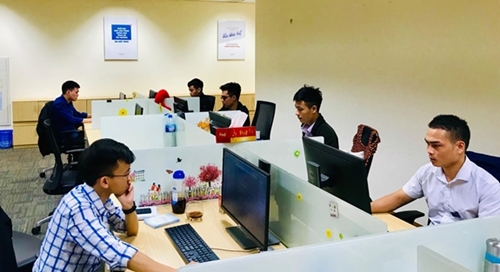Over the past year, under the direction of the Ministry of Science and Technology as the project manager, the Military-Run Telecommunication and Industry Group (Viettel), Technology Group DTT and relevant ministries and branches have built an ecosystem and contributed resources in preparation for developing a Vietnamese digital knowledge system.
    |
 |
|
The team working on the the “Vietnamese Digital Knowledge System” Project |
The project aims to synthesize, systematize, Vietnamize, digitize, store and popularize knowledge in all fields, as well as to encourage people and businesses to participate in the digital knowledge system as both beneficiaries and knowledge contributors. The project will also contribute to developing Vietnam's digital content industry and orienting people’s use of knowledge on the cyberspace.
Deputy Prime Minister Vu Duc Dam, Chairman of the Steering Committee for the Project on Developing the Vietnamese Digital Knowledge System, said: “The country can only be strong once it has stimulated people’s aspirations and creativity, raised people's intellectual standard and national scientific and technological capabilities. Everyone, regardless of their education levels, should join together and support each other in learning, creating and dedicating knowledge in many ways. Developing the Vietnamese digital knowledge system is a shortcut to development in the era of Industrial Revolution 4.0.”
A special feature of the project is that it is not funded by the State Budget. But the funding for the project is mobilized from businesses, social sources and other projects. Those who want to access the knowledge system need to create an account so they can search information, find documents and use applications from the system without paying any fees.
Under Decision 677 / QD-TTg, all ministries and governmental agencies are responsible for putting data on the knowledge system. In fact, a number of ministries and agencies have so far transferred data to the knowledge system. For example, the Ministry of Health has posted 8Gb of data, the Ministry of Education and Training posted 2Tb of data and the National University of Hanoi contributed 10,068 files of documents, more than 15,000 sets of questions and answers and will soon post 15,000 of documents, on the knowledge system. Viettel alone are committed to playing three key roles: Sponsoring server and network infrastructure, developing basic products, funding for the launch of the project.
So far, the Vietnamese Digital Knowledge System has already had 10,295 folders of open data of ministries and branches, 3.5 million sets of questions and answers and 3,177 articles on the "knowledge tree." In the future, the amount of documents and applications will continue to increase, requiring much larger storage capacity. Viettel is now using about 50 servers located in data centers to serve the project and will continue to use more servers when required. At the same time, it is ready to take technical measures to deal with cases of excessive access and overloaded data that may lead to network congestion. Viettel will also fund for all infrastructure and human resources for the project.
As the project involves a large number of areas, Viettel along with participating units has to group data to produce products and applications on the knowledge system. Furthermore, the participating units have to classify data and knowledge on the system for common and special purposes. To accelerate the project, participating officials, engineers and workers have been divided into small groups, each of which is responsible for a component of the general project. The Viettel working group is responsible for classifying, processing documents and then putting the data into the right folder. They also have to classify questions and send them to experts for the answers.
Product Manager at Viettel Cyberspace Center and Head of the Project “Vietnamese Digital Knowledge System” said, “In the future, applications will be convenient and user-friendly as various functions will be integrated into one application. For instance, when you go to a tourist destination, you can open the tourism application to lean about all features of the place without the aid of a tourist guide as well as hospitability and traffic services in the locality.”
He also revealed that the Viettel working group is implementing two applications: Education-Training and Healthcare. The Education-Training Application with a wide range of knowledge will be very helpful and useful to teachers and students at all levels while the Healthcare Application with information about common diseases, how to live a healthy life, how to get fit, how to care for children, old people and so on will be very practical and helpful for all people.
Translated by Thu Nguyen